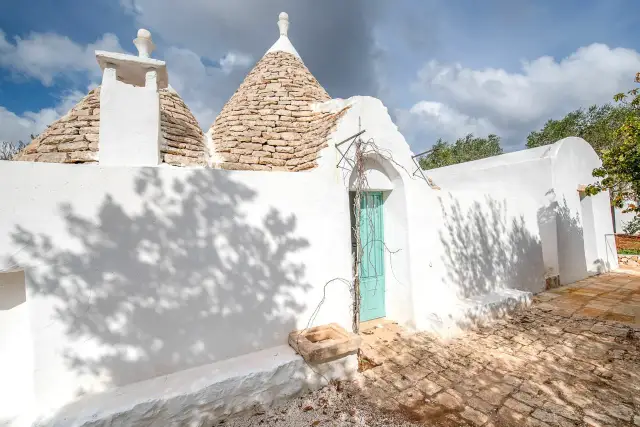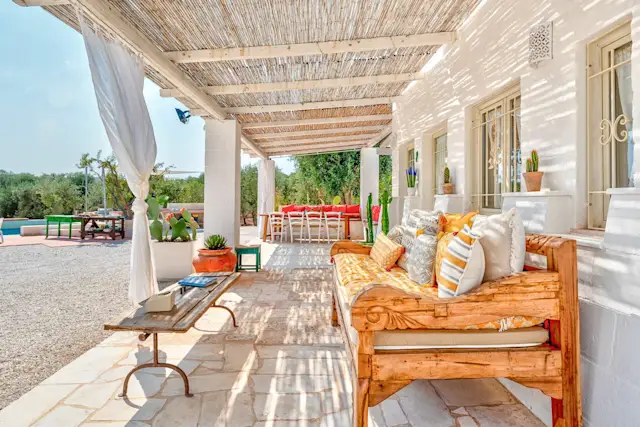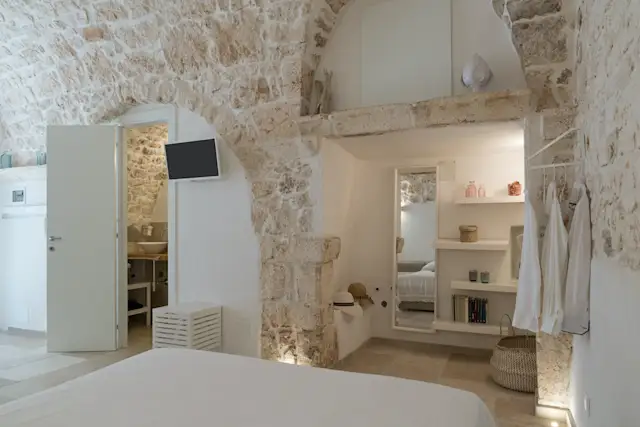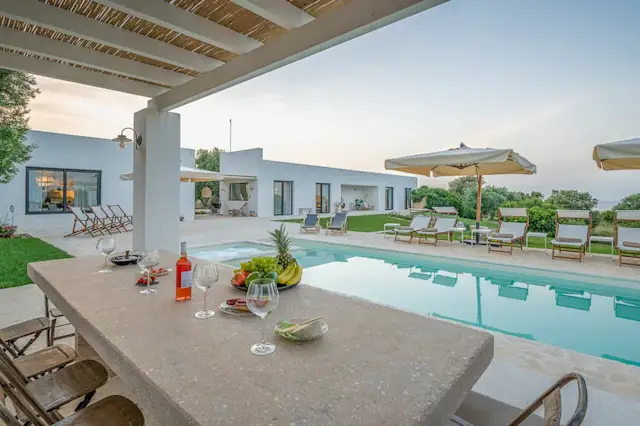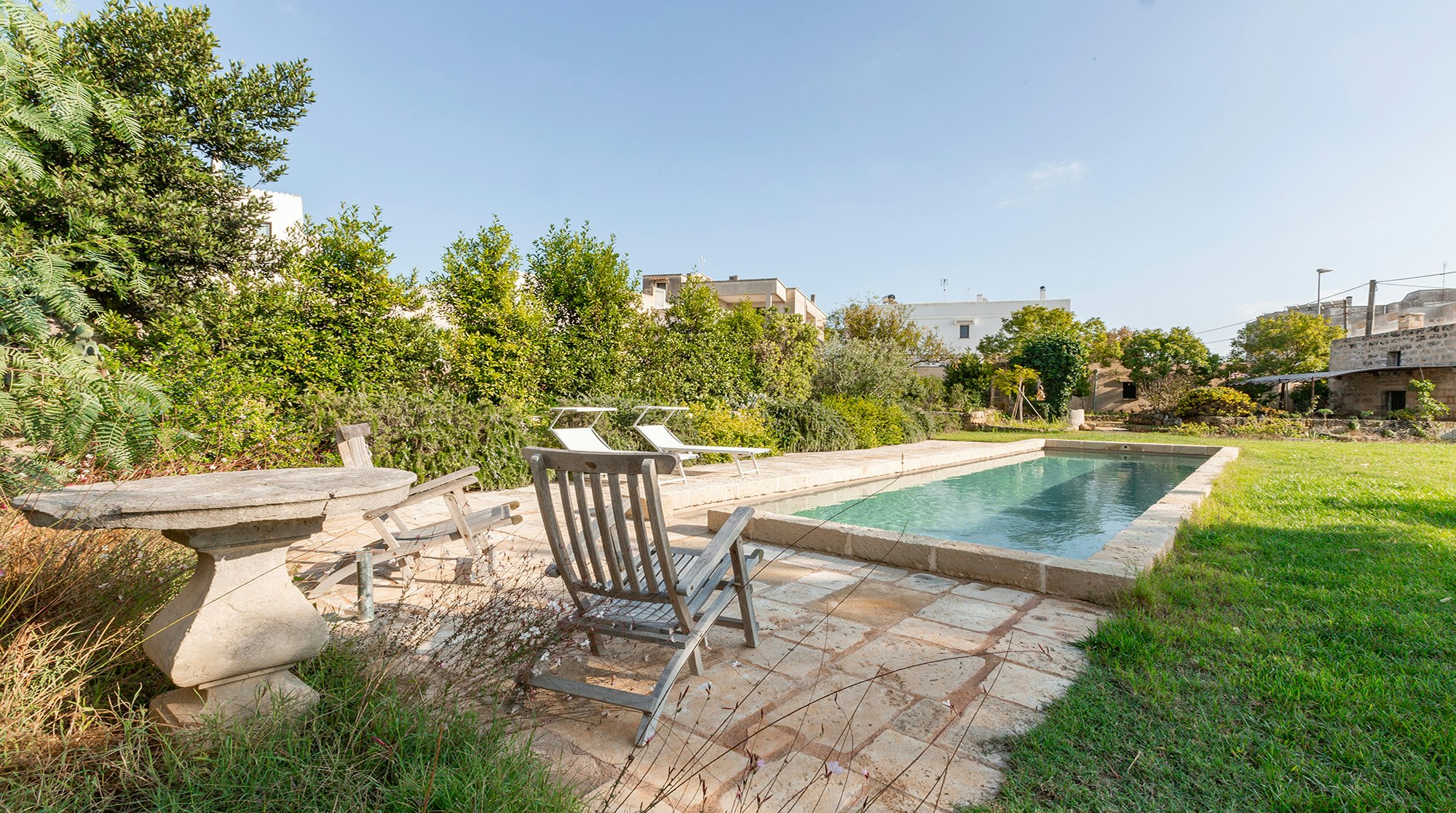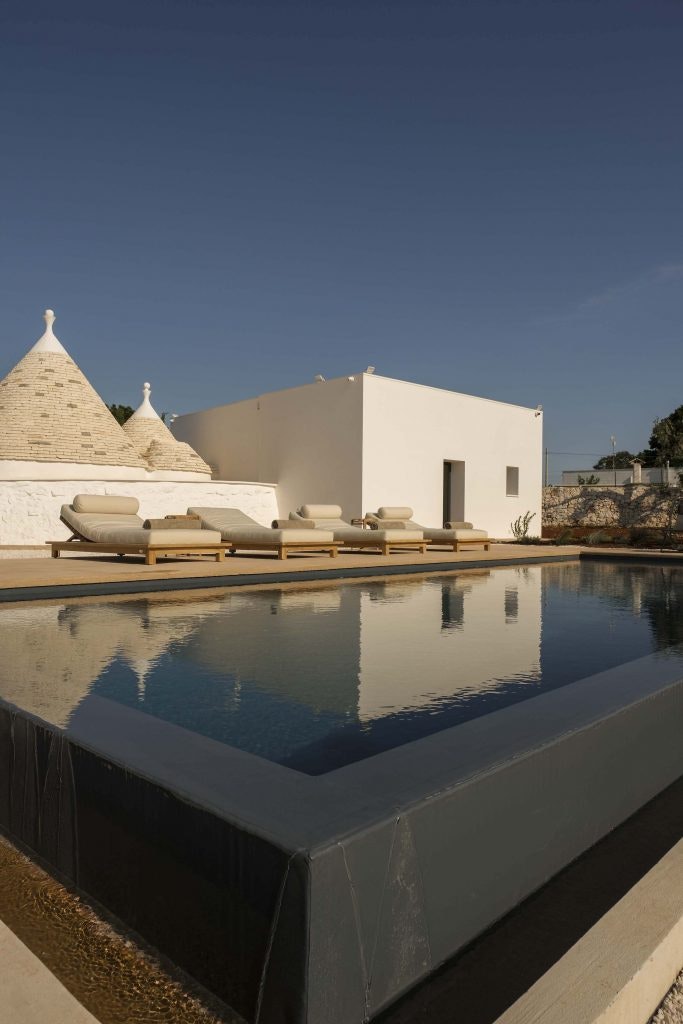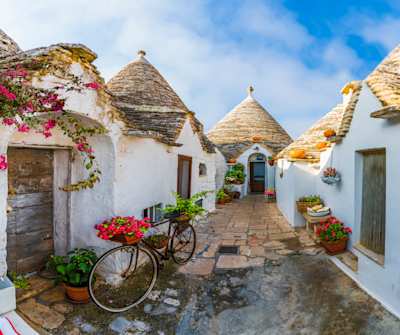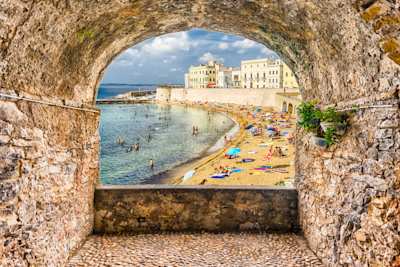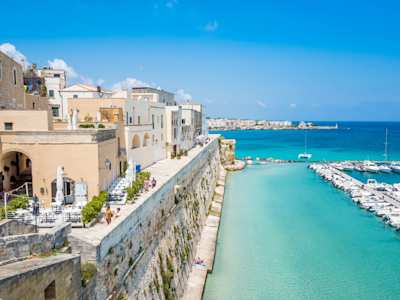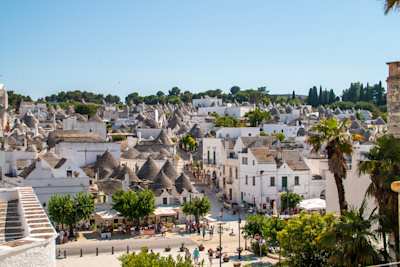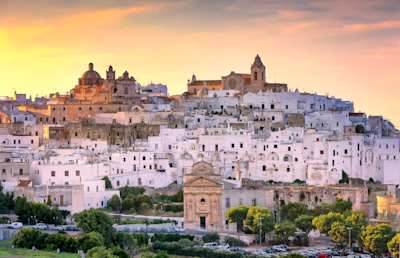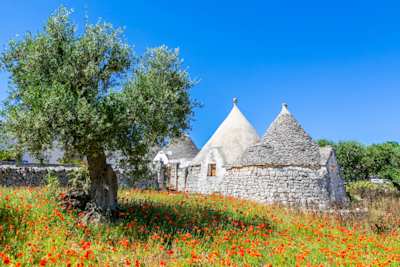The Most Amazing Places To Visit In Puglia
From historical towns to sparkling seas and verdurous countryside, here are Puglia’s finest offerings
~
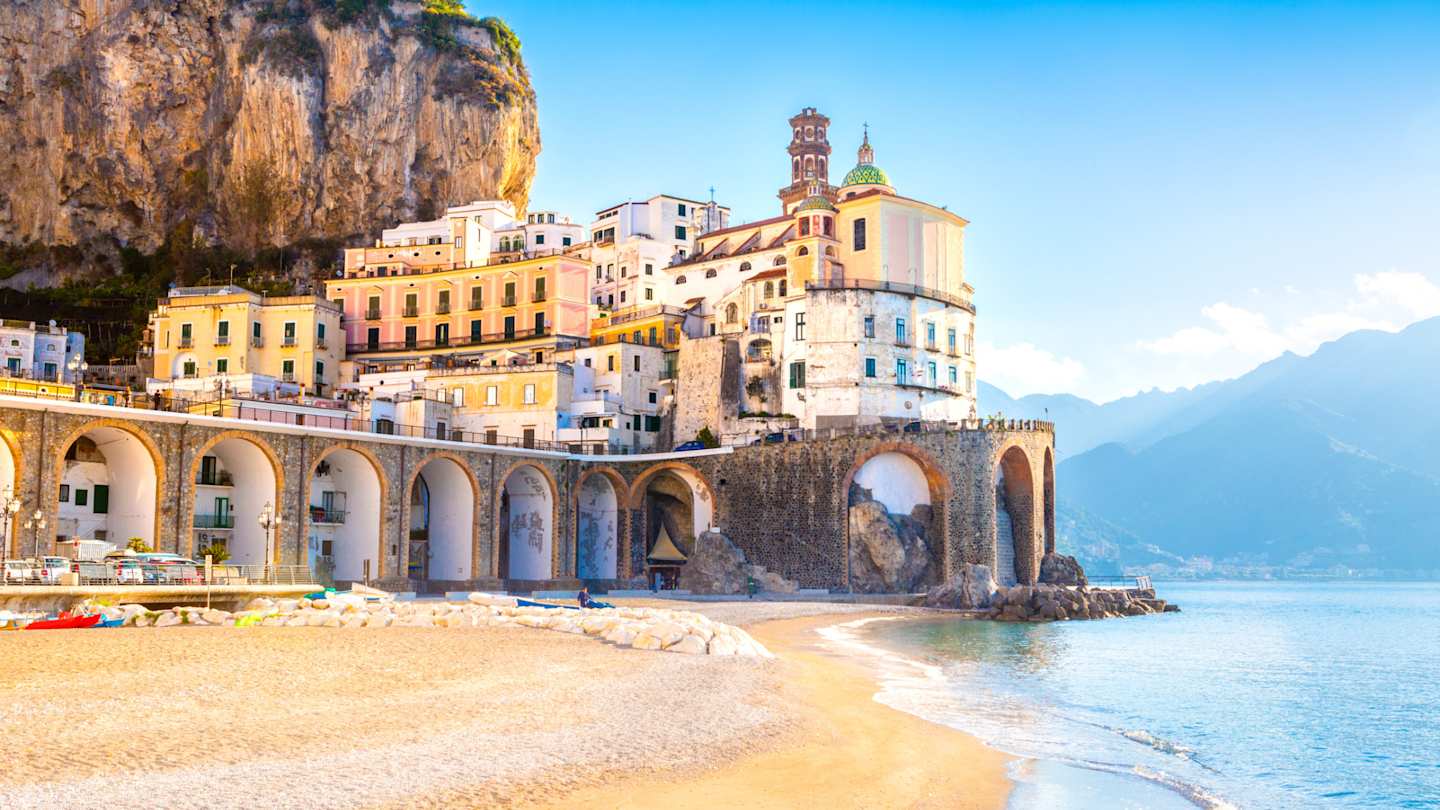
The heel of Italy’s boot has a lot to offer when it comes to places to see. Spend a day splashing about in its crystal-clear waters and the next driving through quintessentially Italian rural landscapes. And it’s not just nature that you’ll find here—the cities and towns have plenty of exciting things to add to your itinerary. Ever experienced travellers, the experts here at Plum Guide know all there is to travelling around Puglia. So, if you’re not sure where to start, take a look at our guide to the best places to visit in Puglia.
Bari
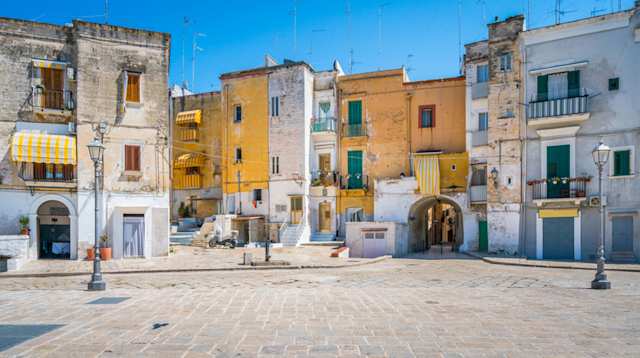
Citta Vecchia, the old town of Bari
Your first point of entry to Puglia will most likely be its capital city, and what better place to get a taste of your surroundings? Bari is a port city on the Adriatic Sea, where you can find both seaside charm and historical appeal. Citta Vecchia, Bari’s old town, is waiting to be explored—discover twisting alleys, cosy piazzas and plenty of churches, including the 11th-century Basilica di San Nicola and the Cattedrale di San Sabino. When it gets too hot, Bari’s surrounding beaches are the ideal spot to cool down—Pane e Pomodoro and Polignano a Mare being popular options. Come evening, take a walk down the Lungomare, the glorious seafront built by Mussolini. Enjoy a sundowner at one of the bars that line the path.
Lecce
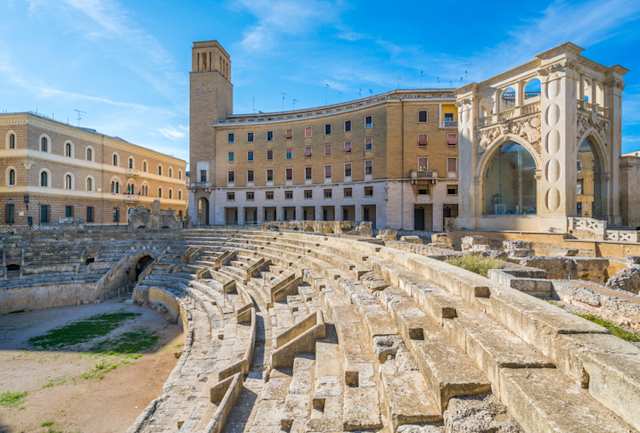
Roman Amphitheatre in Lecce, Apulia
The incredibly charming Lecce is one of the best places to visit in Puglia for baroque architecture. Nicknamed ‘The Florence of the South’, the city is adorned with striking Baroque buildings with intricate details on every street and corner. Take a walk around the city to discover lavishly decorated churches such as the Basilica di Santa Croce with its gold accents and rose windows and the Church of Saints Nicolò and Cataldo with its exquisite frescoes. There’s also Roman architecture to be found, with the well-preserved Roman amphitheatre situated in the main piazza of the old town. As a university town, Lecce has a great range of restaurants and nightlife options, so when you’re not busy sightseeing, simply soaking up the city’s lively and friendly atmosphere is a lovely activity.
Itria Valley
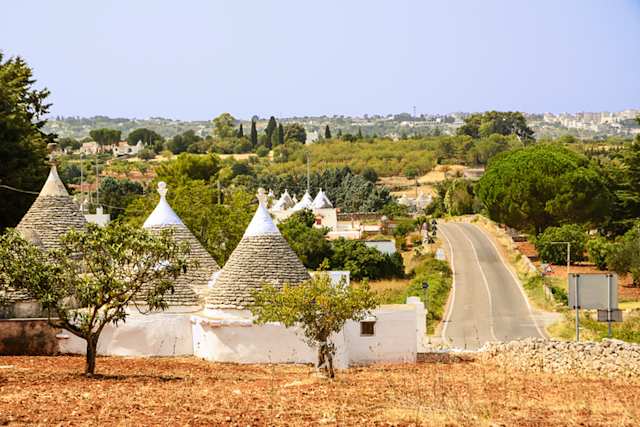
Trulli in the countryside of the Itria valley, Apulia
While Puglia’s cities offer tons of culture and history, its spectacular natural landscapes are not to be missed. One of Puglia’s natural highlights is the Itria Valley, a region between the provinces of Bari, Brindisi and Taranto. This is a fantastic place for a drive or a cycle, where you can pass verdant olive groves, rolling hills and vineyards—naturally, this area is a foodie’s paradise. Satisfy your hunger at one of the whitewashed towns straight out of a storybook. Locorotondo is a lovely pit stop, perched on a hill with magnificent views of the surrounding valley. Wander its narrow streets, its whitewashed buildings serving as a canvas for the bright bursts of flowers which decorate the balconies and staircases.
Ostuni
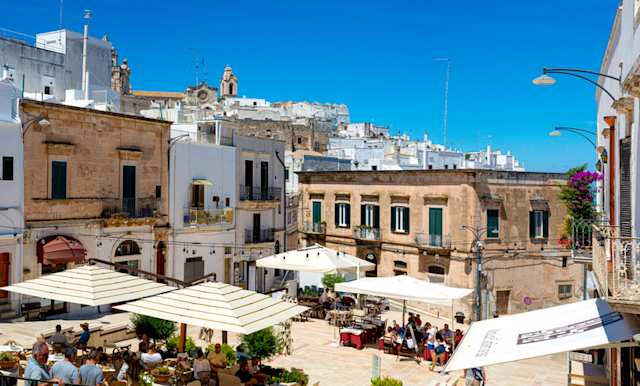
Ostuni square in Ostuni, Apulia
Another must-visit town in the Itria Valley is Ostuni, also known as the White City. This maze-like city is made up of whitewashed buildings that appear to tumble down the hillside. Perched at the very top of the hill is Ostuni’s 15th-century cathedral, which combines Gothic, Romanesque and Byzantine elements—an exquisite finishing touch to the scenery. Admire bucolic views of the surrounding countryside and as far as the Adriatic Sea. Get lost amongst the web of little streets, stopping to browse through colourful shops and sip espressos at charming cafes. If you happen to be there on a Saturday, pop by the weekly market to pick up some fresh produce. Ostuni benefits from being centrally located, so if you’re looking for a base while you’re in Puglia, this is it.
Alberobello
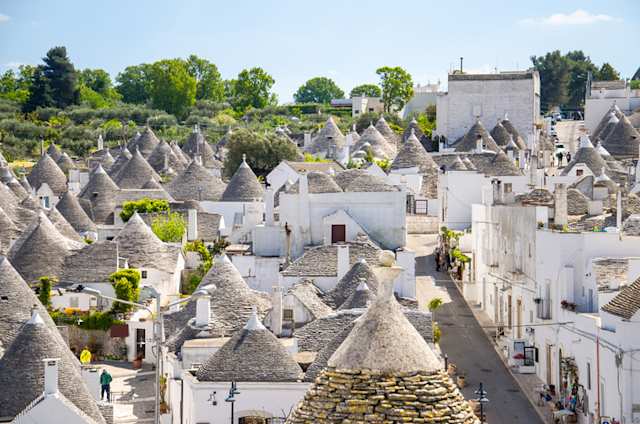
Panoramic view of Town of Alberobello, village with Trulli house in Apulia
One place in the Itria Valley that we couldn’t leave out is the UNESCO World Heritage Site of Alberobello. The town is famous for its large concentration of trulli, traditional dry stone huts with conical roofs specific to this area of Puglia. Although you can find them all over the Itria Valley, Alberobello is the best place to see them and is the only entire town of them—1,500 to be exact. These huts date back to the 16th century, designed to be easily dismantled to avoid property tax should a royal inspection occur. Built along winding cobblestone alleys, these whitewashed huts with pointy roofs are straight out of a children’s picture book, and you half expect a hobbit to appear from behind one of the doors.
Otranto
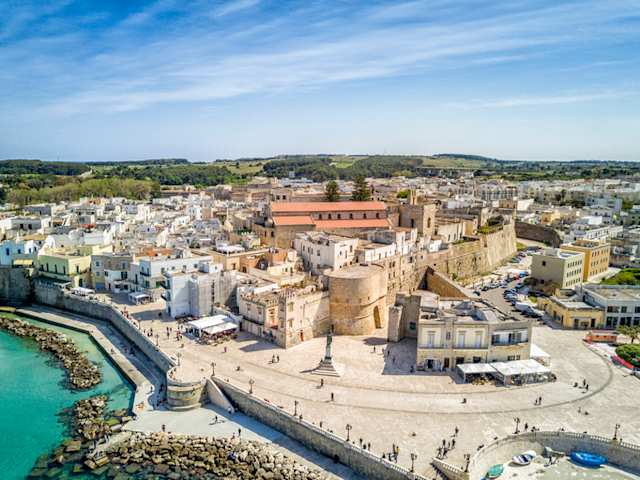
The coastal city of Otranto with Aragonese castle, Apulia, Italy
Italy’s easternmost town is picturesque, with a wonderful mix of history, architecture and beaches. Having seen the Greeks, Romans, Byzantines, Normans and Ottomans invade, this rich history is reflected in the town’s architecture. The 15th-century Aragonese castle, with its thick walls and robust towers, dominates the town. Another must-see is the 11th-century Romanesque cathedral with its elaborate floor mosaic and hair-raising skull collection. Otranto overlooks the Strait of Otranto, where the Adriatic meets the Ionian Sea, and benefits from delightful sea views. Spend time at the town’s white sandy beach and enjoy the views from the promenade.
Gargano
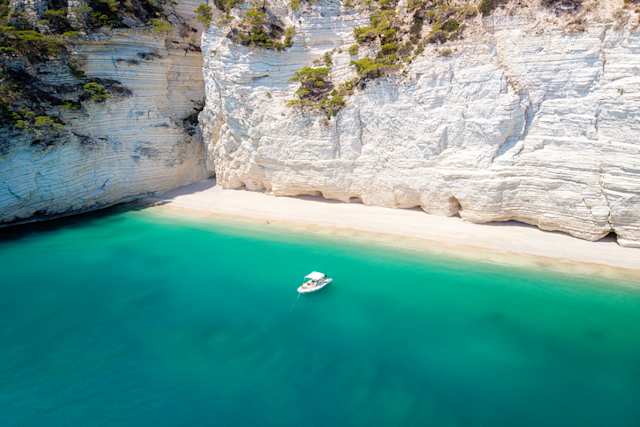
Small boat in turquoise waters with limestone cliffs in the background at Gargano, Puglia
Nature lovers note that the Gargano is one of the best places to visit in Puglia. It’s so beautiful that it’s frankly quite mind-boggling just how overlooked this part of Puglia is. The Gargano Peninsula juts out into the Adriatic Sea, most of it covered by the Gargano National Park. This area is more challenging to get to, so we highly recommend hiring a car so you can visit all the best spots within the region. As you drive, expect to see lush pine forests, olive groves, towering coastal cliffs and pristine sandy beaches. Outdoor activities include hiking, cycling and water-based adventures. There are also a handful of picturesque towns to visit, such as Vieste, Monte Sant’Angelo and Peschici, which make for the perfect stop-off.
Tremiti Islands
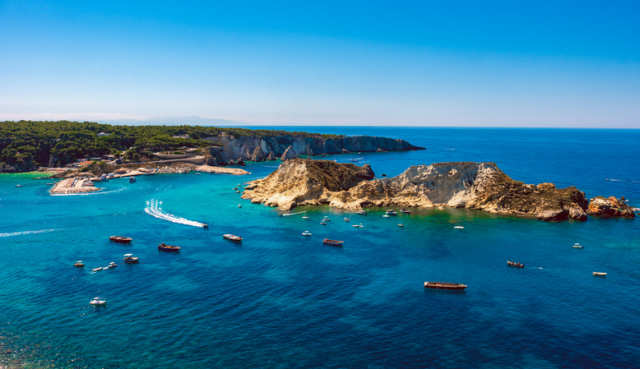
Tremiti Island of San Domino and Cretaccio, Apulia
Also part of the Gargano National Park is the paradisiacal Tremiti Islands. These consist of the five small islands of San Nicola and San Domino and the uninhabited Capraia, Cretaccio and Pianosa. The surrounding azure waters are rich in marine life, and with a bit of snorkelling or scuba diving, you can spot rock archways, underwater caves and sunken plane wrecks. Make your way around by boat, stopping at caves like Grotta delle Viole and Grotta del Bue Marino. You can also journey along the coast by kayak to find your own secluded cove to sunbathe on. The main way of getting around is on foot, as cars aren’t allowed on the islands, guaranteeing a truly relaxing getaway.
Monopoli
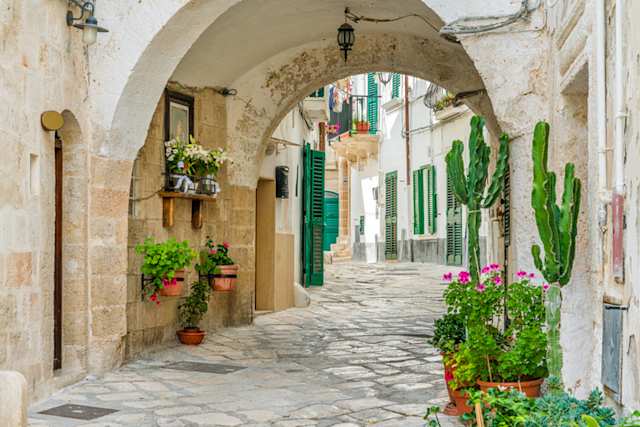
Street in Monopoli, Apulia, Italy
Slightly off the tourist trail, the old fishing town of Monopoli is worth a stop on your Pugliese adventure. Compared with some of the more popular tourist towns, Monopoli has a more authentic feel to it—catch glimpses of everyday life down at the harbour, where fishermen bring in their daily catch or wave to the nonnas watching the world go by from their balconies. Amble through its old town where you can find whitewashed houses and the Basilica of the Madonna della Madia. Down at the seafront, stroll along fortified walls and dip into the cool waters of the sandy cove. In the late afternoon, join the flock of locals to the Piazza Giuseppe Garibaldi for an aperitivo at one of the bars and restaurants that line the square.
Santa Maria di Leuca
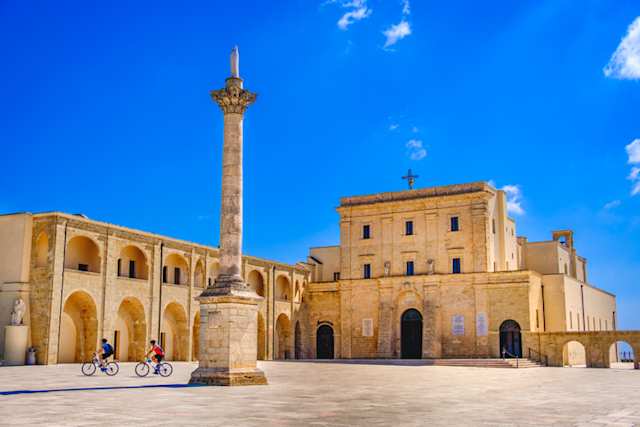
Santa Maria di Leuca Basilica and Corinthian Column, Apulia
Often referred to as just Leuca, this town lies on the southernmost point of the Salento peninsula. It has been a popular resort for Puglia’s wealthiest residents since the early 1900s, evident in the Art Nouveau villas standing proudly along the seafront. Elsewhere along the seafront is the town’s impressive lighthouse which rises 47 metres into the sky. Built in 1864, the lighthouse is still in use today. One of the most popular things to do in Leuca is to set sail along the coast to explore its legendary sea caves, such as the Cave of the Three Doors, the Devil’s Cave and the Lovers Cave. If all that exploring has worn you out, take your pick from the surrounding beaches of Felloniche, Posto Vecchio, Torre Vado and Pescoluse, all of which offer excellent facilities like lidos, bars and restaurants.
